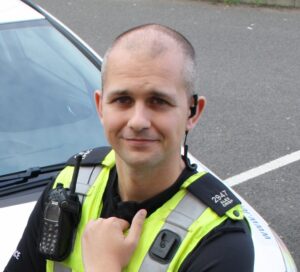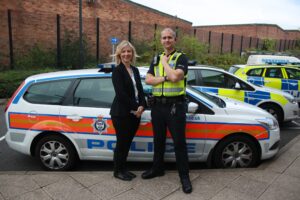Alex Crisp has been part of the street triage project from its earliest beginnings in Leicestershire. In December 2012, he became one of the first police officers to work on the Mental Health Triage Car known as MH01, working alongside dedicated mental health nurses from Leicestershire Partnership Trust. At the time, he was a Police Constable working for Leicestershire Police as a response officer. This week Alex, his colleagues and associated health professionals came together for the first Street Triage EXPO. Alex looks back to the beginnings of the scheme and expresses his confidence and hope for its future...

The role of response officer is the coal face of policing - the proverbial ‘thin blue line’. A reality of policing in this role is the significant contact you have with mental illness. The role of the police is primarily about criminal justice and public safety but in reality it encompasses far more.
Police contact with mental illness comes in a variety of forms often linked to our core functions, for example mental health consumers who become victims and witnesses of crime.
We have specific roles and responsibilities under the Mental Health Act, which we may be asked to perform in partnership with other organisations. However, the most taxing area of work which the police respond to is those at the point of crisis. It is this area which I believe causes the most organisational conflict, and which services such as street triage have successfully addressed and revolutionised.

I will be completely honest, when I became involved with our MH01 project I felt that it was destined to fail due to the relationship being so strained between the police and health services. Ironically I think that cultural change has been one of the most significant parts of our journey with Street Triage and I am proud to say that I was wrong.
A comment made by one of the visitors to our service has become my definition of street triage. Street triage in Leicestershire has both figuratively and literally become ‘a vehicle for change’ in the response to mental illness. The partnership response to mental illness has changed both operational practice but also organisational relationships creating an environment of cooperation rather than friction.
The Street Triage EXPO which we hosted in Leicestershire on 25 August 2015 marked a significant point for me. We gathered representatives from around England and Wales who had an interest in the methodology and jointly celebrated the successes and passion to support those in our community. What I took away from the event was that there was a reality attached to street triage in the fact that you can’t stamp a brand or service spec on it. It needs to develop and grow in different ways depending on your local circumstances and what you have today needs to adapt to the requirements of your community.
I am proud of our successes in Leicestershire and the work of colleagues across the UK and hope that the development of street triage continues.
5 comments
Comment by Doreen mckinley posted on
Mental health needs to be studied in depth sometimes these patients are put in prison. When they should be in a hospital .
Comment by termite posted on
It is sad that mental healthcare providers appear to do very little fro the mentally ill.
Lots of emphasis put on the young, but what about the folk failed by the system fro so many years?
Older mental health patients need support because the system just keeps doping them, nobody looks at causes, they just treat symptoms that can only get worse, so the increase medication which is often not taken because patients gave up hope years ago.
Once you get into the mental health system, there is no hope of getting out of it.
Comment by Mike Llywelyn Cox posted on
Lowestoft - mid nineties. We had an agreement for the Desk Sgt at the station to phone the MH centre if concerned about mental health of person in custody. A psychiatric nurse would then visit and assess. This scheme caught mental ill health early and could lead to early non-compulsory action.
Comment by Sheila Bawar-Sandhu posted on
I hope that the triage system displays more "empathy" than I experienced when I was very ill. The first contact was very kind (I was going to jump off Clifton flyover). However, when I was visited by my psychiatrist, a GP, Social worker and Police (I now realise wit the clear intention and need to section me) I lacked the insight as to how ill I was (typical of mental ill health), and genuinely could not understand why I was being visited.
I finally accepted that I was going to hospital, and asked for 2 minutes (that would be the most) to pick up some underwear and my medication. I was suddenly grabbed by one of the Police officers and the other handcuffed me. I was hauled out of my flat, into the back of a Police van, and driven away without a seatbelt (which would have helped prevent the bruising I sustained by being handcuffed and unable to control my body whilst in the vehicle, hence sustaining some bruising to my body), in a state of shock.
I hope all staff involved with dealing with people who have mental health issues acquire some insight into how those peoples' cognition and self awareness can be affected, and stop treating them as a "problem" rather than someone who is iller than they, invariably, realise.
Comment by B Clark posted on
Street triage might work in Leicestershire but it doesn't in Kent in fact Kent police have withdrawn their support. My daughter is an habitual self harmer, the police have been involved many times she has only seen the street triage once, She had cut herself badly and the manager of the local Tesco called the police who turned up with the street triage, at the same time one of her friends was walking past and said he would take her home, they let her go with him. Later that night I had to take her to the local A&E.